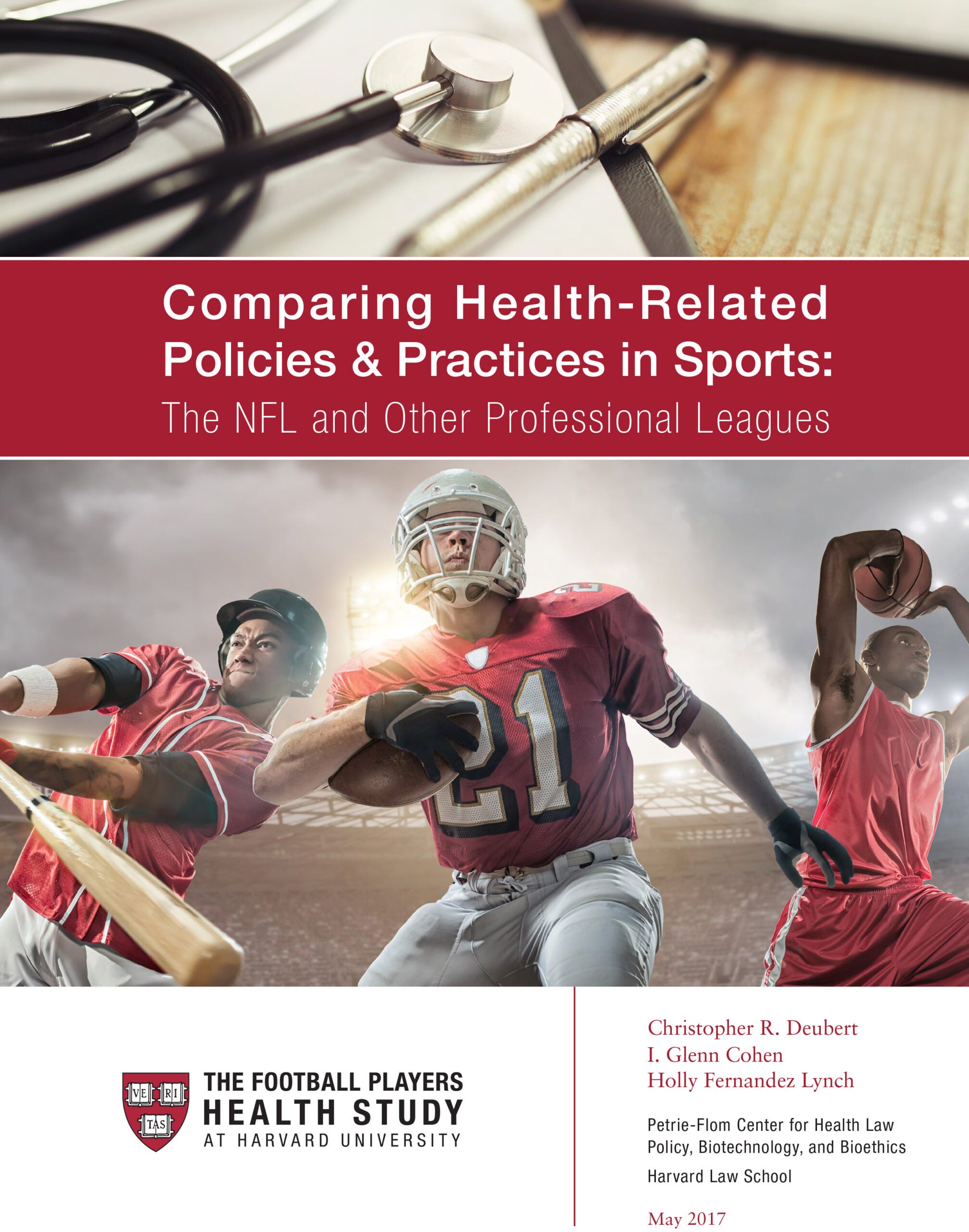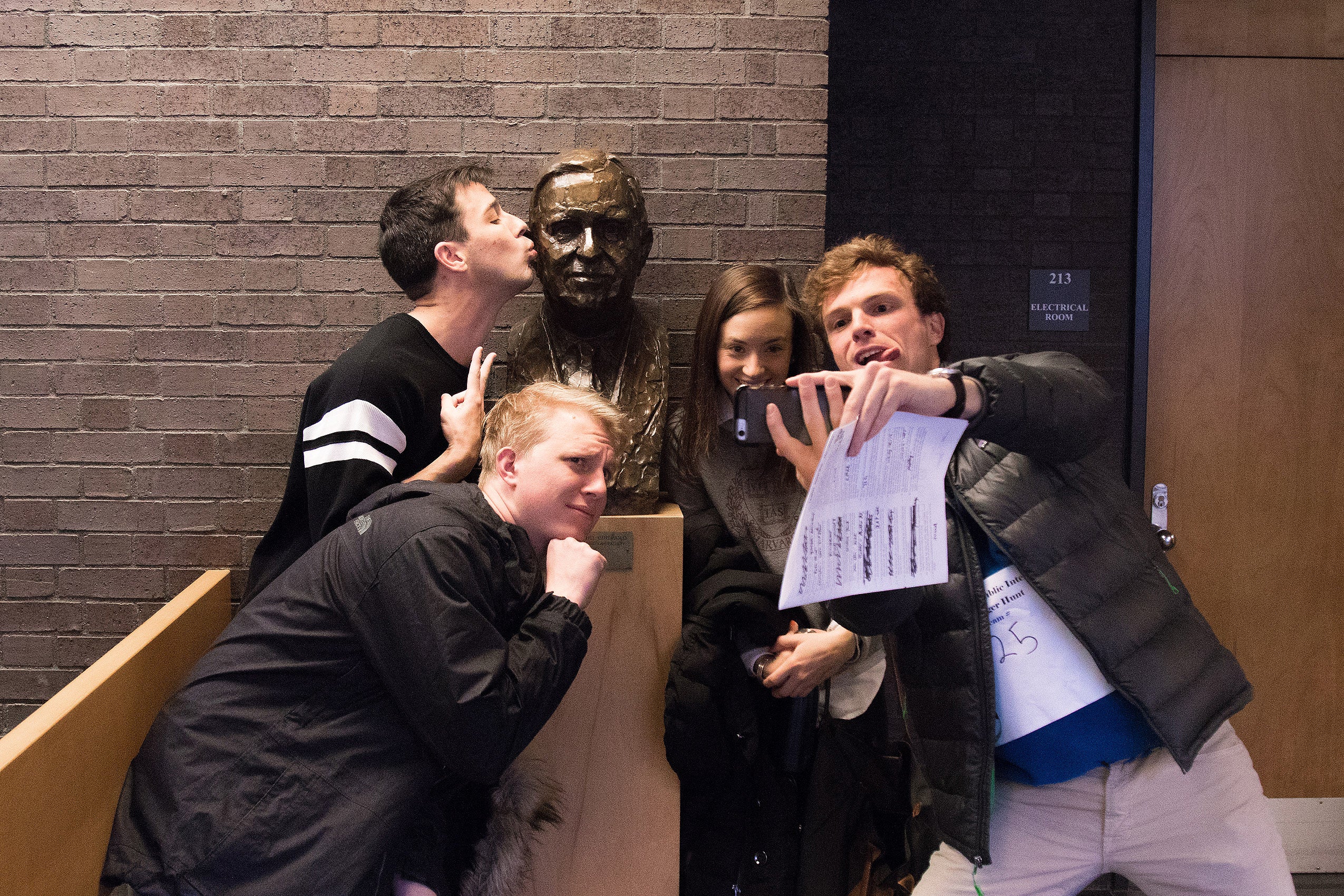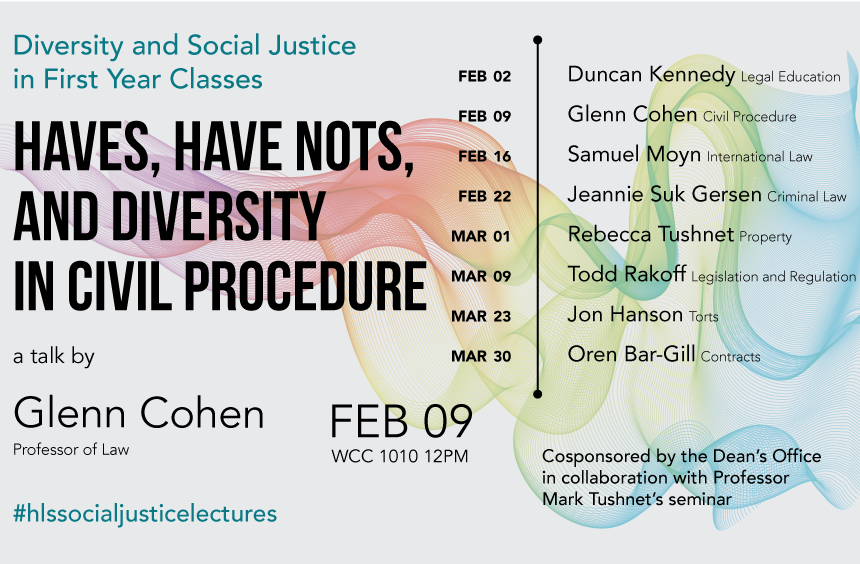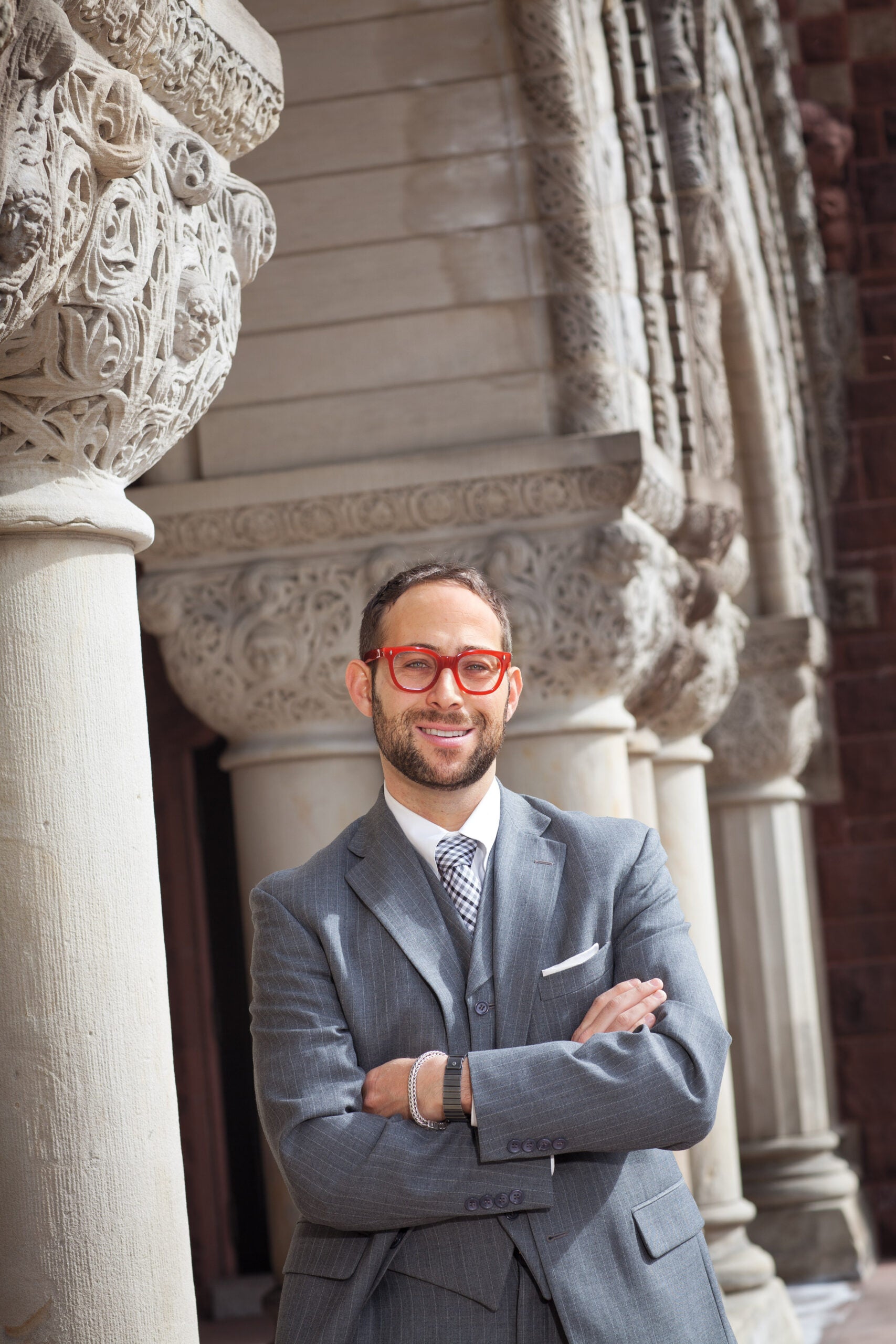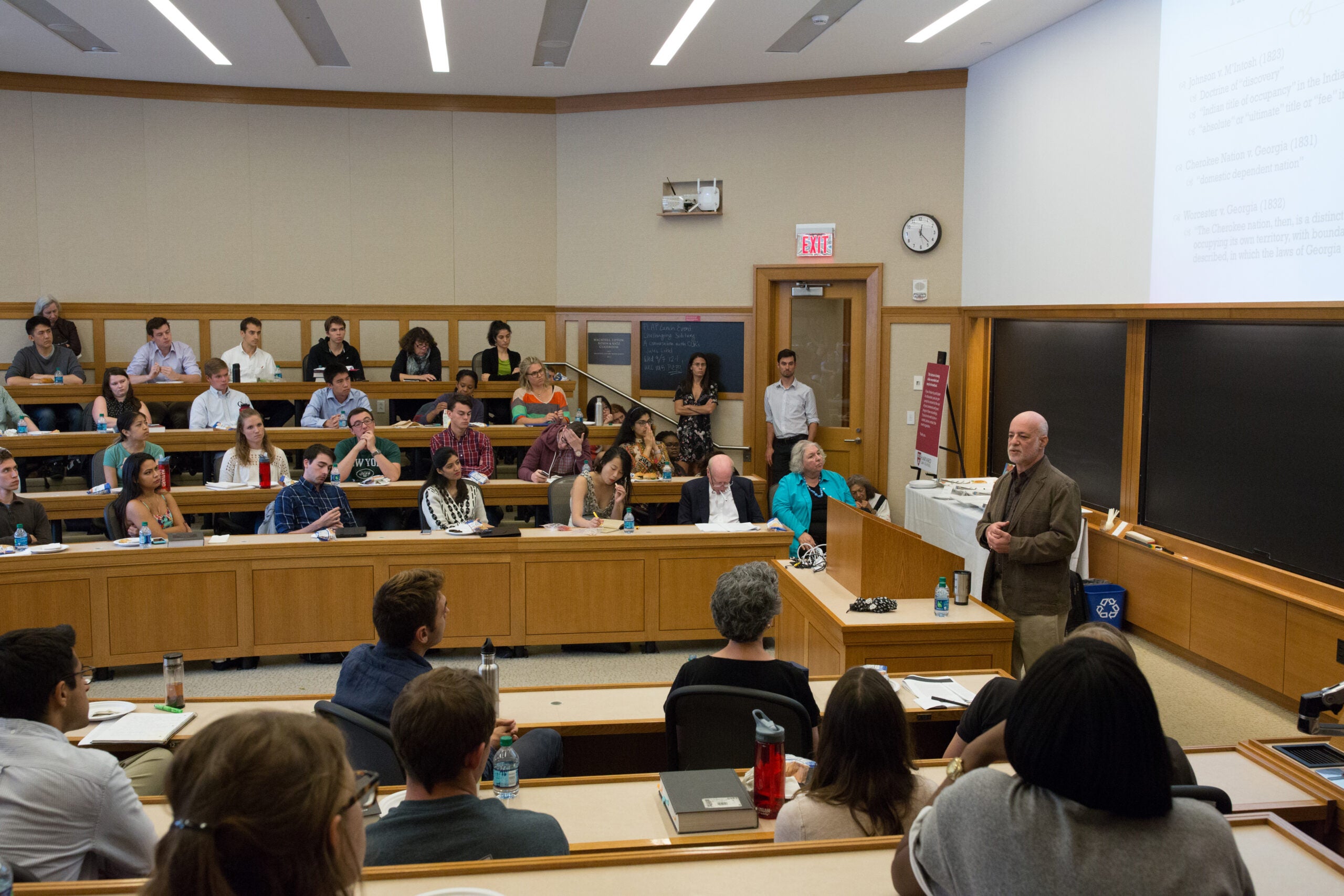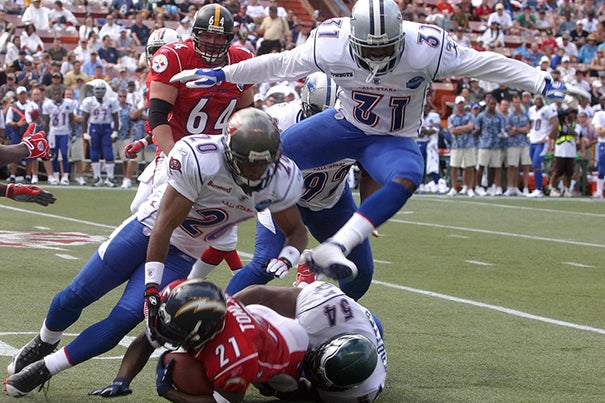People
Glenn Cohen
-
Harvard’s Advice for NFL Player Health and Safety
May 16, 2017
...The sport of football, in 2017, is in a state of intense self-scout. The reasons are many: self-preservation, love for the game, fear of the game, concern for the livelihood, a desire to find concrete answers to nebulous questions. Etc. It’s in this landscape that Harvard researchers released a new report today about the health and safety practices for players at the game’s highest level. It’s part of the Football Players Health Study, a long-term project funded through the NFL Players’ Association by money set aside in the 2011 collective bargaining agreement...“We are in a moment where [because of] people’s attitudes toward football and toward the health risks of football, these conversations have to happen,” says I. Glenn Cohen, Harvard Law School professor and a co-author of the study.
-
The physical demands are different. The types and severity of injuries are different. And the economics can vary wildly. But there are several common threads shared by professional sports leagues when it comes to health and safety issues, and a new report from the Harvard Law School is seeking to identify, study and compare them...“In terms of employee benefits, we think the NFL actually offers many employee benefits that Fortune 500 companies and many good employers do not,” said Harvard’s Glenn Cohen, one of the study’s co-authors...“Where players have only played one or two seasons (and perhaps games), there might be questions as to whether it is appropriate to provide lifetime health insurance to someone who was employed for such a short period of time,” states the report, which was co-written with Christopher Deubert and Holly Fernandez Lynch.
-
Harvard report compares NFL’s health policies and practices to other pro sports leagues’
May 15, 2017
While the NFL’s player health policies and practices are robust in some areas, there are opportunities for improvement in others, according to the findings of a new report by researchers at Harvard Law School's Petrie-Flom Center -- the first comprehensive comparative analysis of health policies and practices across professional sports leagues.
-
Should We Study Human Embryos Beyond 14 Days?
April 27, 2017
...The 14-day rule is an ethical line past which cultured human embryos are not to continue developing outside the body. It is protected by law in 12 countries, including the United Kingdom, and acts as a guideline in five, including the United States....Some critics view calls to re-evaluate the 14-day rule as a pernicious moving of the goalposts. How meaningful can they be, the line of reasoning goes, if scientists want to change rules as soon as they bump up against them? “There were disagreements about the rationale and validity of the 14-day rule before this point, but no one in the research community really pushed the issue because it was not particularly important,” says Glenn Cohen, a Harvard bioethicist. “There is nothing wrong with pragmatic necessity driving us to start a re-examination process.”
-
Harvard Law School scavenger hunt for public interest
April 12, 2017
More than 350 students raced through the halls of Harvard Law School solving clues, answering trivia questions, and taking selfies with professors as part of the school's first ever Public Interest Scavenger Hunt, which had students competing for prizes as the community came together to show support for students working in public interest law.
-
A Miami-based neurologist who has treated Florida Panther players says a "turf war" is preventing neurologists from being represented on the National Hockey League's Concussion Subcommittee. Since 1997, the subcommittee has been advising the league on how best to treat players who suffer head injuries and brain trauma...One Harvard University law professor says that the NHL should overhaul its medical structure to free team doctors and trainers from any real or perceived conflicts of interest. Glenn Cohen, a Montreal native who is the director of Harvard Law School's Petrie-Flom Center for Health Law Policy, Biotechnology and Bioethics, published a report in November that urged the NFL to adopt new guidelines for team medical staff so doctors who treat players are not required to report to coaches and other team management. "For both the NFL or the NHL, whenever you have a club physician who is trying to serve both the interests of an injured player and management, there's a recipe for an ethically problematic state of affairs," Cohen said in an interview this week.
-
Prohibiting sperm donor anonymity in the US and possible effects on recruitment and compensation
April 4, 2017
An article by Andrew Hellman `19 and Glenn Cohen. Many children conceived using donor sperm or eggs want to know their biological parents. In the US, some clinics make the identity of the sperm donor available to a donor-conceived child at age 18. Most intending parents, though, choose sperm donation programs that do not reveal the identities of the sperm donors – so-called 'anonymous sperm donation' (though some have questioned whether true anonymity is possible in a world of social media and direct-to-consumer genetic testing).
-
The NFL Combine: Pro football’s intrusive, and mandatory, job interview
February 27, 2017
A dozen years ago, when Jeff Foster first came to National Football Scouting, the company that runs the NFL combine, he surveyed all 32 teams. The sport’s biggest job fair has four components — an on-field workout, medical testing, player interviews and psychological testing — and Foster wanted to know what teams valued the most. “All 32 teams said medical was No. 1,” Foster explained recently. “All 32 teams said interviews were No. 2.”...While there could be a gray area between tests that measure performance and those that examine health, Glenn Cohen, a Harvard law professor who co-authored the study, says the list of questionable exams the NFL requires of draft prospects is long: heart tests, blood tests, X-rays and MRI exams, psychological tests, even exams measuring eyesight or range of motion.
-
During this year’s spring semester, Mark Tushnet, the William Nelson Cromwell Professor of Law, is teaching a novel seminar called “Diversity and Social Justice in First Year Classes.” It combines classroom teaching with an eight-part public lecture series examining how issues of diversity and social justice can be integrated into the core 1L classes.
-
Could Roe V. Wade Survive A More Conservative High Court? (audio)
February 3, 2017
The Supreme Court case Roe v. Wade is one of the most controversial the justices have ever considered. Since the 1973 decision, it has been a lightning rod, causing emotional and political reactions on a regular basis. But what did the high court’s decision actually do? And could Roe survive a more conservative court? We talked about that with Harvard Law Professor Glenn Cohen, an expert in reproductive technology and related topics.
-
The Trump-era Supreme Court could erode abortion access with a ‘death by 1,000 cuts’
January 30, 2017
With control of the presidency, the House of Representatives, the Senate, and at least one Supreme Court seat to fill, the GOP will have the opportunity to make sweeping changes in the next four years. Since opposing abortion is part of the Republican Party's platform, Americans can expect a reproductive-rights fight will be part of the agenda...Glenn Cohen, a health-law expert and professor at Harvard Law School, said two kinds of laws provide the most likely paths for SCOTUS to overturn or undermine Roe. The first are known as fetal-pain laws. They aim to ban abortions when a fetus can feel pain, which legislators typically claim is after 20 weeks, though scientists disagree...The second kind of law is what reproductive rights activists call Targeted Restrictions on Abortion Providers, or TRAP laws, that impose strict requirements on abortion clinics and providers.
-
The promise and peril of emerging reproductive technologies
January 20, 2017
Harvard Law School Professor Glenn Cohen co-authored an article for the journal Science Translational Medicine on the legal and ethical considerations regarding in vitro gametogenesis (IVG), a new, experimental technique that allows scientists to grow embryos in a lab by reprograming adult cells to become sperm and egg cells.
-
Behavioral science suggests that Obamacare may not change as much as Republicans claim
January 3, 2017
An op-ed by Christopher T. Robertson, Holly Fernandez Lynch, and I. Glenn Cohen. In the waning days of his administration, President Obama encouraged Americans to take advantage of the opportunity to get health insurance in what may be the last open enrollment period under the Affordable Care Act. Given the incessant chatter about the incoming administration’s plans to “repeal,” “repeal and delay,” or “repeal and replace” the act, is this just a fool’s errand — wasted effort adding more people to the slate of millions who will lose coverage if the ACA gets dismantled as promised? Perhaps. Or perhaps Obama is seeking to capitalize on the well-studied phenomenon known as loss aversion. In a nutshell, loss aversion means that it feels worse to lose something than never to have had it in the first place. Consumers, including those signing up for health insurance, tend to make relative judgments about their own welfare, rather than absolute judgments, and losses loom larger than gains.
-
Diversity and U.S. Legal History
December 7, 2016
During the fall 2016 semester, a group of leading scholars came together at Harvard Law School for the lecture series, "Diversity and US Legal History," which was sponsored by Dean Martha Minow and organized by Professor Mark Tushnet, who also designed a reading group to complement the lectures.
-
Simmons vs. Gladwell: The Future of Football
December 1, 2016
...Gladwell: I would actually go further: Players should be limited to 15 of 17 games. Football has lent itself to complication, and two “bye” games for every player just doubles the fun. Also, surely the goal here is to materially decrease the injury burden. Which leads me to my first issue: In mid-November, a group at Harvard University issued a 493-page report on health care in the NFL. Their main recommendation was that the physicians who take care of injured players should no longer report to the clubs. That’s a clear conflict of interest.
-
Should We Ban Anonymous Sperm Donation?
December 1, 2016
There’s a push underway to change the way that most sperm is donated in the United States — which is to say, anonymously. That’s largely because anonymity can prevent donor-conceived kids from getting important information about their genetic heritage, and any predispositions to medical conditions. But a new study suggests that banning anonymous sperm donation could have the unintended effect of dramatically reducing the pool of donors, hiking up prices, and, potentially, forcing sperm banks to become less selective. “Donor-conceived children across the world have clamored for the right to have identifying information on their sperm and egg donors,” said co-author Glenn Cohen, a professor at Harvard Law School, in a press release. “To understand whether systems requiring the sharing of that information are a good policy, we need considerable data on the effects of such law changes and our study fills that gap.”
-
The Football Players Health Study at Harvard University today released a set of legal and ethical recommendations to address a series of structural factors that affect NFL player health. The Football Players Health Study is a research initiative composed of several ongoing studies examining the health and wellbeing of NFL players.
-
When NFL calls the doctor
November 17, 2016
An op-ed by I. Glenn Cohen, Holly Fernandez Lynch, and Christopher R. Deubert. From major media outlets to federal research funding to conversations among concerned spectators and parents, the nation is at a moment of unprecedented focus on the potential health consequences of playing football, especially at the professional level. There is a clear need to develop better preventative, diagnostic, and therapeutic interventions for individual players. However, to truly protect and promote player health, it is essential to address individual factors and structural features simultaneously. One such structural feature is the relationship between players and the club doctors from whom they receive care. The system must do more to ensure that players receive excellent health care they can trust from providers who are as free from conflicts of interest as possible.
-
NFL doctors’ conflicts of interest could endanger players, report says
November 17, 2016
Doctors that work for professional football teams have conflicts of interest that could jeopardize players’ health, according to a report by Harvard researchers...“[Players] are treated by people who are well-meaning, don’t get me wrong, but operate in a structure that’s infected with a structural conflict of interest,” said I. Glenn Cohen, a Harvard Law School professor who coauthored the report. “That conflict of interest is that they serve two people — they serve the player and the serve the [team].” The report quotes an unnamed player who says that some players don’t trust doctors because they work for the team. Coauthor and Harvard Medical School professor Holly Fernandez Lynch said investigating individual instances of jeopardized decision-making fell outside of the scope of the report.
-
NFL doctors should not report to teams, Harvard study recommends
November 17, 2016
A new report from Harvard Law School proposes drastic changes in the way health care is administered in the NFL, urging the nation’s most popular sports league to upend its system of medicine and untangle the loyalties of the doctors and trainers charged with treating players...In interviews, the Harvard researchers say they were surprised by the league’s response. “I had expected we’d maybe be quibbling around the margins of how it would actually be implemented,” said Holly Fernandez Lynch, the executive director of the Petrie-Flom Center and one of the report’s authors. “I did not expect that we would have to have this conversation about whether there is, in fact, a conflict because it’s so obvious on its face.” “Admitting you have a problem is the first step to get over,” added Harvard law professor Glenn Cohen, another of the report’s authors, “and while we think many of the people who serve as club medical staff are wonderful doctors and excellent people — this is not to besmirch them or their reputation — it is not going to produce a good system if you’re operating under an inherent structural conflict of interest and one that is corrosive to player trust.”
-
First-generation college students are coming in last
November 13, 2016
An op-ed by Glenn Cohen, Dan Pedrotty, Jason Schmitt and Mario Nguyen `17. Midway through the first semester of the school year is a time when many college students begin struggling with exams, roommate disputes, and career plans. But the one-third of college students who are first in their families to attend college (“first-gens”) face a different formidable set of challenges. For two-thirds of these first-gens, college reality likely involves living at home and working while commuting to local community colleges or earning online degrees. Only 40 percent of first-gens will graduate from four-year colleges within six years, earning that critical degree that helps open doors to higher earnings and good jobs. This trend can be reversed but requires addressing challenges faced specifically by first-gens.
